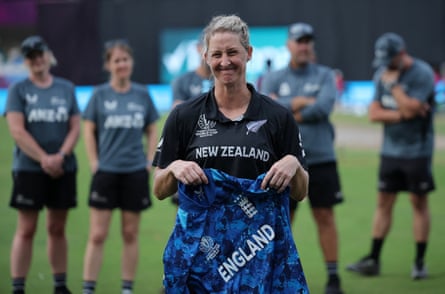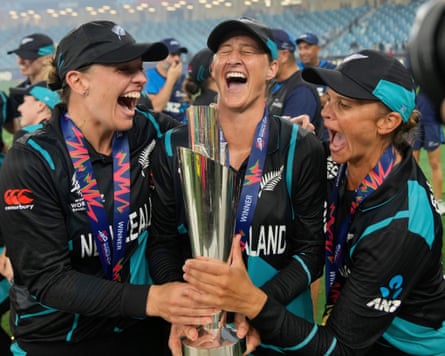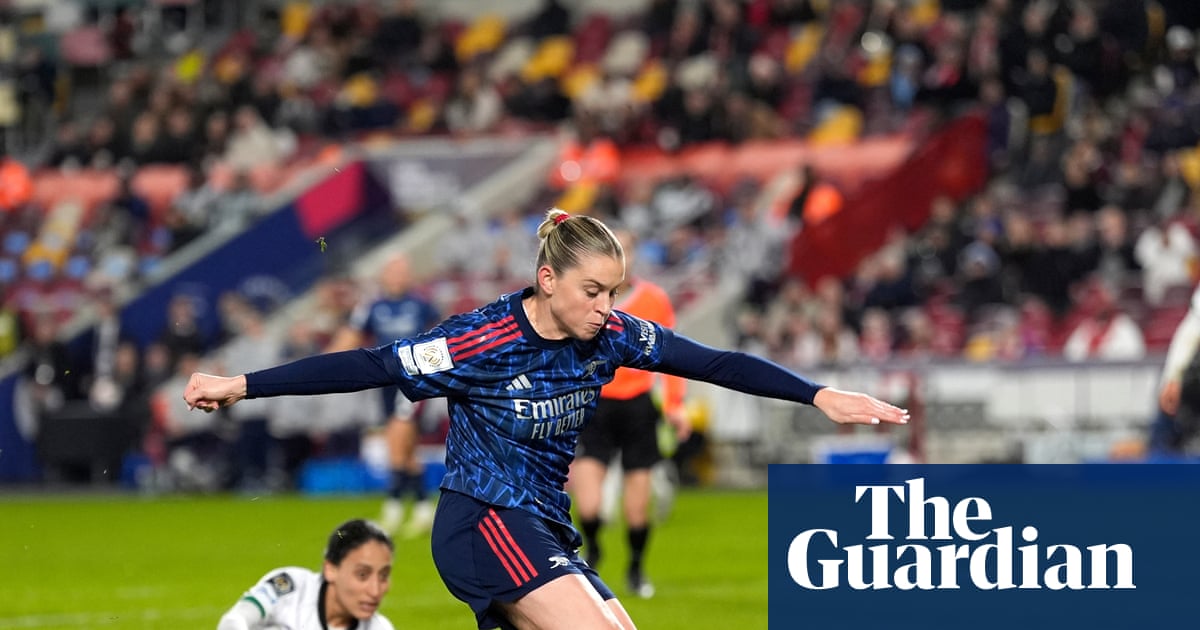As the Women’s World Cup has progressed, sanding down the edges and turning up the four semi-finalists you might have predicted from the start, a sideshow has been quietly playing stage left. A down-to-earth sideshow – just like the woman herself – the Sophie Devine farewell.
Devine made her New Zealand debut in October 2006, in an ODI and T20 series against Australia. Nineteen years later, still with the same open face and broad smile, she has played her final one-day international – a losing affair against England neither side will polish up for the mantelpiece. The most memorable moment came at the end with the affectionate guard of honour given to Devine by both sides and the Māori tribute led by Melie Kerr and sung by her teary teammates as the stadium emptied.
Devine swallowed a sob or two, but at 36 she has lost none of her sparkle and was New Zealand’s leading scorer in the competition, fifth on the league-stage leaderboard despite two games being washed out, with 289 runs at an average of 57.80.
Her career numbers are equally impressive, she is a member of the exclusive club of women who have more than 4,000 ODI runs and 100 ODI wickets – only Ellyse Perry and Stafanie Taylor have made more than her 4,279 runs – with nine hundreds – and taken more than her 111 wickets.
But her contribution is much more than even those raw figures. Ask around about Devine and you are enveloped in warm affection. “The big thing that stands out for me is her character,” said Heather Knight. “She’s still probably the same character she was when she got in the team when she was 20, still that cheeky girl that has fun, but is a proper cricketer.
“She’s one of the people that pushed the game forward in terms of how you take on different bowlers, she’s someone that can hit the ball better than anyone in the women’s game and she was doing that before everyone else was.”

The careers of Devine and Clare Connor, the ECB’s managing director of women’s cricket, did not quite overlap, but Connor could not be more positive. “If I had a daughter making her way in the game now I’d make sure she knew about Sophie Devine and what she stands for,” she said.
“Even before I told her about her immense skill as a player, I’d tell her about passion, her love of her country and its indigenous history, her devotion to her teammates, her humility and her thoughtfulness about our sport and her place in it; her openness about mental health and anxiety and kindness, and so much more.
“We talk about being a role model quite freely and loosely. If I could only nominate a few of the amazing women from our sport to true role model status, she would be one of them.”
Apart from her skills, both hard and soft, her remarkable longevity (only Suzie Bates, of all New Zealand cricketers, has played for longer), the against-the-odds T20 World Cup win against South Africa in 2024, her innovation and her ability to pound the ball, Devine also spanned the eras. When she started her international career, as a teenager, women’s cricket was defiantly amateur – she took two years out to play hockey for her country. But since 2022 New Zealand’s men and women have earned the same match fee in international and domestic competition. That the Test fee is the same is sadly irrelevant as New Zealand’s women have played none since 2004.
In an interview with her old mucker Bates on Sky last week, Devine was asked how she felt about not having played a single Test during her illustrious career. “It depends on the day,” she said. “It probably would have been over in a day and a half, but we’d have had a bloody good time. It’s unfortunate that it hasn’t happened in our careers, but maybe one day it will for the other girls in the team. It is so cool to see females playing in that format.
“It’s been the highest of highs to the lowest of lows,” she went on, picking through her career, “but that’s cricket. When we won the World Cup every little thing went our way. We got on the rollercoaster and it felt like it was meant to be … it is something that you always dream of when you play for nearly 20 years, it’s the moment that you play for, and it was great to experience that at least once.”
after newsletter promotion

As her batting skills improved – she is one of five women to have batted at every position in the order in ODIs – Devine has done less with the ball and has been managing type 1 diabetes throughout. She has also spoken out, criticising the ICC for the absurdity of organising a World Cup in Sri Lanka during monsoon season.
“World Cups come round every four years. I heard [Pakistan’s captain] Fatima Sana also speaking about it. They don’t play much cricket, we don’t play much cricket, especially in the ODI format, and to have the World Cup so badly affected by something that everyone knows about … you certainly hope moving forward there is a bit more future planning.”
Knight reckons Devine might have one more T20 World Cup in her, to be held in England next summer. If she does, we should cherish her while we can.
Connor again: “She’s one of very few players over the past 30 years who emit such joy and fun and love of the game to those around them, but who are also true fighters. It’s a rare mix. Lottie [Edwards] springs to mind. Very few others. That’s what you want in international sportsmen and women and if you could bottle it, you would.”
It has been a hell of an innings.
This is an extract from the Guardian’s weekly cricket email, The Spin. To subscribe, just visit this page and follow the instructions.

 3 months ago
39
3 months ago
39

















































